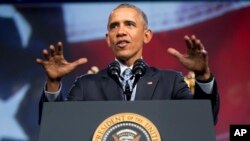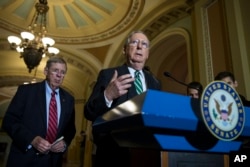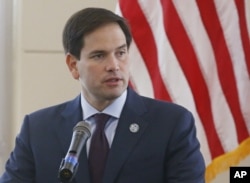U.S. President Barack Obama says a two-year government spending plan that Congress completed early Friday is "responsible," and that he will sign it as soon as it reaches his desk.
"This agreement is a reminder that Washington can still choose to help, rather than hinder, America's progress," Obama said after the Senate voted before dawn to adopt the budget by a wide margin. The vote completed action on the spending plan, since it had been voted on Wednesday by the House of Representatives.
The Republican-controlled Congress has sparred on numerous occasions with the Democratic president over spending priorities, several times leaving the country on the brink of market-rattling financial deadlines.
Spending limits
The new plan limits the overall size of the U.S. budget to about $4 trillion a year through March 2017, weeks after Obama leaves office and and by which time there will be a new president and Congress. It also extends the government's borrowing authority to that point, eliminating the possibility that it could default on the nation's long-term debt obligations.
Until this week's deal in Congress, a debt-default confrontation had been expected next week.
"It locks in two years of funding and should help break the cycle of shutdowns and manufactured crises that have harmed our economy," Obama said.
Even with an overall spending limit, Congress still faces contentious debate in the weeks ahead over budget limits and programs for individual agencies. The president urged lawmakers to "invest in America's priorities without getting sidetracked by ideological provisions that have no place in America's budget process."
Government funding
One likely testy debate centers on more than $500 million in government funding for Planned Parenthood, a women's reproductive health organization that conducts tests and other screenings, but also performs abortions.
Obama and Democratic lawmakers support the continued funding. But conservative Republican lawmakers are trying to end government spending for the group after an anti-abortion activist secretly taped Planned Parenthood officials casually discussing how they provided discarded fetal tissue to researchers trying to develop cures for chronic diseases.
Anti-abortion activists accused Planned Parenthood of selling the tissue, although the health-care group said it only accepted money to cover its expenses. After the controversy erupted several months ago, Planned Parenthood said it would no longer accept any money for providing fetal tissue for research.
The Senate approved the new spending bill by a 64-35 vote shortly after 2:30 in the morning.
Conservatives denounce deal
Conservative Republican senators denounced the deal as fiscally irresponsible and a surrender to Democrats and the White House.
“This agreement isn’t perfect,” said Republican Senate majority leader Mitch McConnell, a central figure during weeks of negotiations between Congress and the White House.
Despite its flaws, however, McConnell said the bill “rejects tax hikes, secures long-term savings through entitlement reforms, and provides increased support for our military.”
“Each of these items was a Republican goal heading into the negotiation,” he added.
Democratic Leader Harry Reid agreed with McConnell that the bill is not ideal.
“But this budget agreement accomplishes two major priorities that Democrats have long supported,” Reid said. “Number one, it promotes economic growth. ... And it ensures we invest equally in the middle class and the Pentagon.”
Automatic spending cuts
The bill cancels tens of billions of dollars in automatic spending cuts, known as sequestration, that were imposed on military and domestic programs in 2013. Overall, federal spending would rise $80 billion over the next two years.
To pay for the spending boost, the bill seeks cost savings from programs that benefit America’s elderly and boosts revenue through a series of one-time measures, such as the sale of oil from the government’s emergency petroleum reserve.
“I oppose this deal,” said Florida Senator Marco Rubio, who is seeking the Republican presidential nomination.
In a statement, Rubio said the bill “fails to seriously address the long-term drivers of our debt [and] contains no fundamental reforms to stop Washington from spending money it doesn’t have.”
Another Republican senator, Orrin Hatch, known as a fiscal hawk, said the deal is the best that could be achieved in an era of politically divided government.
“If you are going to wait for that perfect bill to come around, my experience has taught me that you are likely to wait a very, very long time,” Hatch said.
In the House, moderate Republicans joined with Democrats to pass the bill, overcoming fierce opposition from the chamber's most conservative lawmakers.
















